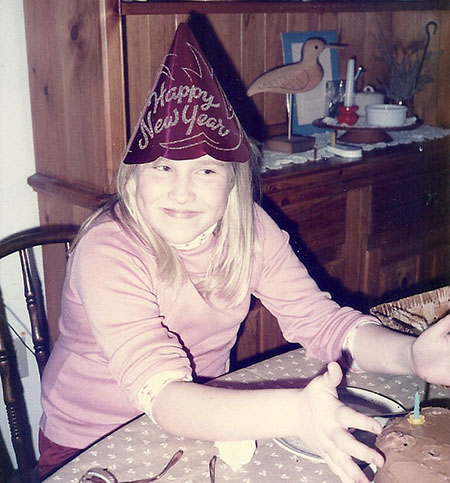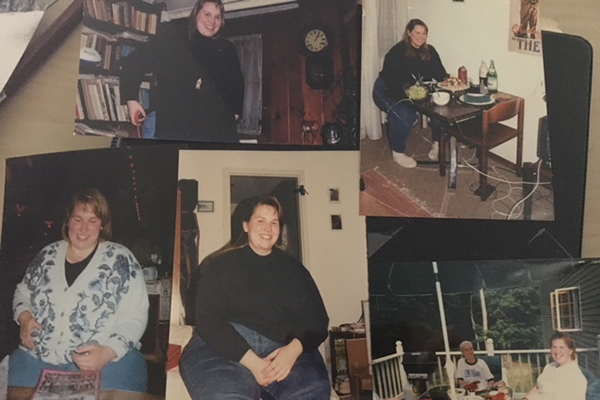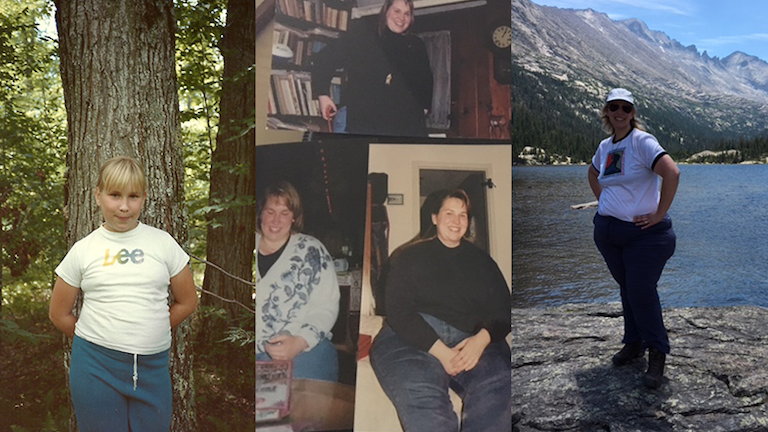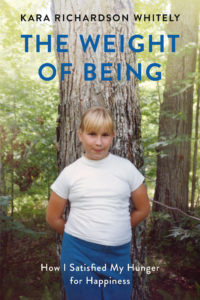For Eating Disorders Awareness Week, author Kara Richardson Whitely of The Weight of Being reveals how she developed binge eating disorder (BED) at age nine, going on to weigh 360 pounds at her heaviest. Decades later, these are the surprising steps that helped her recover
I used to think that food saved me. When I was nine, I hid in the pantry. My parents were on the verge of divorce. The crunching of chewing drowned out the sounds of their screams.
Then when my father essentially abandoned us, food became my friend. As my body grew bigger, I became less confident in my own skin and a target for bullies. I swallowed my emotions instead of fighting back.
Things took a dark turn when I was sexually assaulted on my 12th birthday. I got out of the situation by offering the family friend something to eat. I gained 40 pounds that summer. Food consumed me.

It was dismissed as I was a growing girl, but bite by bite I swallowed my feelings, felt worse about myself and then ate some more.
Then food became my everything – the highs, the lows. Until it pushed my body as high as 360 pounds and away from the things I loved.
Binge Eating Disorder (BED) only entered the DSM-V, a manual for diagnosing conditions, five years ago. So I lived most of my life thinking I had a willpower deficiency along with a smattering of depression.
Sometimes I called it ‘food addiction’; other times, ‘compulsive overeating’.
BED is a biologically-based condition with symptoms including eating to the point of discomfort on a regular basis, hiding food and feeling crushing shame and guilt for eating behaviours.
BED involves frequent overeating or binging with a feeling of a lack of control and distress about it. According to the US-based Eating Recovery Center, someone with BED might:
- Eat more rapidly than normal
- Eat until feeling uncomfortably full
- Eat large amounts of food even when not feeling physically hungry
- Eat alone because of feelings of embarrassed stemming from how much one eats
- Feel disgusted with oneself, depressed or guilty after eating
Do you think you or someone you know is suffering from this eating disorder? Take this short binge eating disorder quiz.

It wasn’t for a lack of trying to lose weight – at one point, I lost as many as 120 pounds. I felt on top of the world so I hiked Kilimanjaro, Africa’s highest peak, to celebrate.
But then I got pregnant with my first child and the binging behavior and more than half the weight came back.
I returned to the mountain without conquering my eating disorder and even binged the night before heading to Kili.
I’ve hiked Mount Kilimanjaro three times but I would be conquered by a cupcake
Spoiler alert: epic fail. The third time I went to the mountain I returned with a resolve of living where I was and going from there and I made it weighing as much as 300 pounds.
So even though I’ve hiked Kilimanjaro three times, I would be conquered by a cupcake.
This wasn’t just an occasional sweet; I would binge and replace food, swirling in secrecy and shame for days. I’d eat more to make myself feel better. And on it went.
it had so little to do with food but really having skills to deal with life – the good and the bad – without food as my crutch
Since that third climb, I had the courage to dive deep into therapy, not only to understand why I binged but to learn tools and get support for where I want to go.
I had to learn that it had so little to do with the food but was really about having adequate skills to deal with life – the good and the bad – without food as my crutch.
This is the story of ‘Weight of Being’. Knowing that not even bariatric surgery was enough, I could get the therapy I needed to heal and live a life of my dreams without food pushing them away.
At the moment, I’m about 100 pounds down from my highest weight.
But here’s the thing. This isn’t about the weight or vanity.
My body shape is quite similar just a bit smaller. This is about being able to do the things I love. I’ve booked a trip to Hawaii for an active vacation – from snorkelling to waterfall tromping – with my family. My husband and I will trek to the top of Mauna Kea, one of the world’s highest peaks.
This is about getting my life back.

Here are the seven things I learned that helped me recover from binge eating disorder.
Binge eating disorder often has nothing to do with food
I had to learn that I ate because of what life was throwing at me. So professional help, to steer me to cope with the highs and lows of being, was critical to discover peace with food. I don’t avoid any particular food now. Instead, I manage stress so that I don’t turn to binging to calm down.
Sleeping is key
One of my biggest triggers has been sleep deprivation. Some people struggle with Night Eating Syndrome. Resetting and honouring your sleep cycle is key.
Self worth can be built
I spent so many years stuffing down my feelings and self esteem that it takes time and skills to find confidence, assertiveness and self-care again. Retraining my inner critic was like domesticating a wild dog.
Binge Eating Disorder thrives in isolation and secrecy
The more I kept my feelings and actions private, the more I struggled. It was through reconnecting with community – my family, my therapist, online groups such as Binge Eating Connection – that I found peace. Swallowing my feelings only fed my behaviours.
Recovery and peace around food is possible (but it has nothing to do with a number on the scale)
After a lifetime of shame and frustration, this was hard to believe. For me, it has nothing to do with the number on the scale but living without the shame cycle with every bite I take. I strive to make sure each thing nourishes me instead of pushing down how I feel.
Moving doesn’t have to be punishment, it can being joy
I think of exercise as something that brings me closer to my values. I love to hike and be in nature; so anything I do at the gym fuels that ambition. I started with 20 minute walks. I now love the community and structure of TRX and Spinning classes.
Food is an ongoing relationship
There is a delicate balance between planning and flexibility. I know to look for red flags, when I start grazing instead of taking time for my meals. That isn’t a signal to wallow in my error, but to regroup and have a think or conversation about what is going on that is leading me off track. Every meal is an opportunity to be kind to yourself.
Kara Richardson Whitely is the author of Gorge: My Journey Up Kilimanjaro at 300 Pounds and new book The Weight of Being: How I Satisfied My Hunger for Happiness (Seal Press) published on 30th August, 2018.
More Healthista Content
My clean eating became orthorexia nervosa
How to spot an eating disorder at work
Mel Wells: ‘Finally learning to love my body helped me overcome my eating disorder’
Does yoga encourage eating disorders?
WIN an overnight spa stay worth £279 by taking our 5-minute survey
Do you want to experience ultimate relaxation? To be in with a chance to win an overnight spa stay for two including treatments and meals, complete our five minute survey about how your gut health affects your relationships
Like this article? Sign up to our newsletter to get more articles like this delivered straight to your inbox.
























































